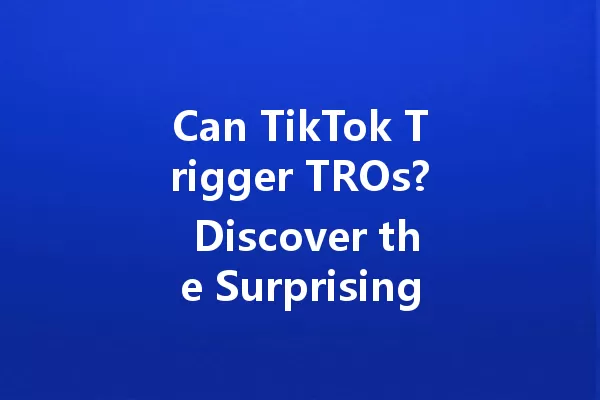
As TikTok continues to gain immense popularity, it surprisingly intertwines with legal matters, particularly regarding Temporary Restraining Orders (TROs). These legal tools can be triggered by the content shared on TikTok, leading to unanticipated consequences for users. But how does this connection work in practice?
Understanding TROs in the Context of TikTok
A Temporary Restraining Order is a legal injunction that prevents an individual from performing certain actions, often to protect a person from harassment, stalking, or immediate harm. On platforms like TikTok, individuals may share content that could unknowingly cross these legal lines. For example, if a user posts a video exposing someone’s private information or making harmful accusations, the targeted individual could respond by seeking a TRO to protect themselves.
The relationship between TikTok’s vibrant, sometimes volatile content and legal repercussions showcases a rapidly evolving digital landscape. Users need to be mindful of the potential consequences of their creative expressions. Here are some scenarios in which a TRO could come into play:
Real-Life Cases: When TikTok Turned Legal
There have been instances where TikTok content has resulted in TROs being filed. For instance, a popular TikTok star posted a video that seemed innocuous but revealed sensitive information about a fellow creator, leading the affected party to seek legal action. Such cases illustrate the need for caution and awareness in the digital space.
Notable Incidents of TROs Related to TikTok
| Incident | Description | Outcome | Date |
|||||
| User A vs. User B | User A posted a video alleging User B’s involvement in a crime | TRO granted, video taken down | January 2023 |
| User C harassment | A series of videos directed at User C led to a harassment claim | TRO issued, user temporarily banned | February 2023 |
| Privacy breach | A TikTok user shared another’s private location unexpectedly | TRO filed; court ordered removal of content | March 2023 |
TikTok Content Guidelines and Legal Awareness
TikTok has community guidelines in place designed to protect users and promote positive interaction. However, these guidelines can sometimes fall short when it comes to more serious legal implications. Since the platform thrives on creativity, users often push boundaries without realizing the potential repercussions of their actions.
Understanding both user responsibilities and potential legal outcomes becomes crucial. Creators should actively consider the following:
The Impact of Viral Content on Legal Issues
When content goes viral, it often garners the attention of not just fans but also those who might be negatively affected by it. This can escalate into serious legal trouble. In some cases, the rapid spread of a video can fuel outrage, leading to quick legal actions like TROs being filed.
Additionally, the fast-paced nature of TikTok means that creators might not always have the time to fully think through the implications of their posts.
By navigating this complex interplay between creativity and legality, TikTok users can ensure they continue to create content without crossing those essential boundaries that could lead to TROs or other legal issues.
A Temporary Restraining Order (TRO) serves as a legal tool designed to restrict an individual’s actions in order to protect another person from potential harm. It acts as a safeguard, often coming into play in situations where someone feels threatened or harassed. The purpose of a TRO is to provide immediate relief and prevent further incidents while the legal matter is being resolved. This is particularly crucial in cases of stalking or domestic violence, where timely intervention can be essential for safety.
These orders are typically granted when a court determines that there’s enough evidence to suggest that the target of the order poses a risk to the applicant’s safety. TROs can cover a range of prohibitions, such as preventing the individual from contacting the applicant, being near their residence, or engaging in specific behaviors that could contribute to ongoing harm. The legal processes surrounding TROs are often fast-tracked to ensure that the relief provided aligns with the urgency of the situation.
Frequently Asked Questions (FAQ)
What is a Temporary Restraining Order (TRO)?
A Temporary Restraining Order (TRO) is a legal injunction that prevents an individual from engaging in certain behaviors or actions, usually to safeguard someone from potential harm, harassment, or stalking. TROs are commonly issued in response to urgent situations where immediate relief is necessary.
Can TikTok posts lead to a TRO?
Yes, TikTok posts can potentially lead to a TRO if the content violates someone’s rights or is deemed harmful. For example, videos that involve harassment, defamation, or privacy invasions can trigger legal actions, including seeking a TRO.
How can I protect myself from legal issues when using TikTok?
To protect yourself from legal issues on TikTok, familiarize yourself with the platform’s community guidelines, think critically about the content you share, and avoid including personal information of others without consent. Consulting with a legal professional before posting contentious material can also be beneficial.
What should I do if I receive a TRO related to my TikTok content?
If you receive a TRO, it’s essential to understand the terms outlined in the order. Compliance is crucial, as violating the TRO can lead to further legal trouble. Consider seeking legal advice to navigate the situation effectively.
Are there any examples of TikTok content resulting in TROs?
Yes, there have been instances where TikTok content has resulted in TROs. For instance, a user might post a video accusing someone of a crime or sharing private details without consent, prompting the affected individual to seek a TRO as a legal response.
内容结尾插入,支持HTML代码,如果不需要请删除